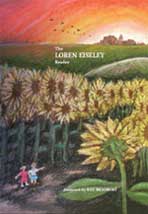Biography
Loren Corey Eiseley
1907-1977
by Naomi Brill*
Loren Eiseley likened the brain of a writer to "an unseen artist's loft" in which "pictures from the past" were stored and brought forth to be magnified or reduced in order to form a pattern. Many of the patterns he created in his work were associated with his experiences during his years growing up in his prairie state, Nebraska. The land, the people and the institutions left an ineradicable mark upon him and colored what he did.
Born in 1907 in Lincoln, he spent his first crucial years in the eastern part of the state, only leaving in 1933 to begin graduate study in anthropology. His time was characterized by the end of pioneer days in the Middle West, the growth of towns and cities, and the accumulation of wealth. The capital city, in which he spent most of those early years, doubled in population. In the 26 years from 1907 to 1933, Lincoln grew from 40,000 to 80,000 residents and it was in those years that the schools, museums, and libraries that were so important to him were established.
The Eiseley family always lived on the edge of town, somewhat removed from the people and the community from which they felt set apart through poverty and family misfortune. This setting, however, opened the adjacent country to a wandering boy with an early interest in the natural world. It was to this world he turned for the satisfactions he did not find at home. It provided easy access to the pond where he collected specimens for his aquarium, to the cave in the creek bank and to other locations that would eventually find their way into his writings. He described the lands around Lincoln as "flat and grass covered and smiling so serenely up at the sun that they seemed forever youthful, untouched by mind or time--a sunlit, timeless prairie over which nothing passed but antelope or wandering bird."
Loren Eiseley's father, Clyde, worked as a hardware salesman with long hours and little remuneration. A sometimes amateur Shakespearian actor, he gave his son a love for beautiful language and writing. The tie between father and son was close--he thought that Loren was a "genius, but moody".
His mother, Daisey Corey, was described as "an untaught prairie artist". She was a beautiful woman who had lost her hearing in childhood and was locked in a silent world. Given at times to irrational, destructive behavior, she communicated with her son by thumping on the floor. It was an unhappy marriage and left its mark on the young child who felt forever alienated from his mother.
But, in spite of this, there were people in his world who opened the door to a happier life. His half brother, Leo, gave him a copy of Robinson Crusoe with which he taught himself to read. His Uncle Buck and Aunt Grace, who lived nearby, opened their home to him and helped him financially. The former took him to the natural history museum, Morrill Hall, where the fossils fascinated him and led to his future career. He made Neanderthal heads from clay; and with the help of his grandmother, Melinda Corey, baked them in the kitchen oven and stored them in a nearby barn. Somehow he found his way to the public library and became a voracious reader.
Eiseley attended the Lincoln Public Schools where in high school he wrote that he wanted to be a nature writer. Disturbed by his home situation and the illness and death of his father, he dropped out of school and worked at menial jobs while trying to avoid the truant officer. He enrolled in the University of Nebraska, wrote for the newly formed Prairie Schooner, and went on digs for the Museum. His education was interrupted by tuberculosis for which an enforced stay in the mountains and desert was mandated. In addition, his restlessness and unhappiness resulted in a year of riding the rails all over the west. Finally, in 1933, he was awarded a BS Degree in English and Geology/Anthropology.
Eiseley went on to secure his Masters and PhD in Anthropology from the University of Pennsylvania and to do post-doctoral work at Columbia University. He taught at the University of Kansas and at Oberlin College, then returned in 1949 to the faculty at the University of Pennsylvania where he worked until his death.
In 1938, Eiseley married Mabel Langden of Nebraska. It was a childless marriage in which she devoted her entire life to her husband and his career, a career which was marked by increasing fame as a writer, science educator, teacher, and philosopher. In 1942, the Scientific American published his first popular essay, "The Folsum Mystery", which was the forerunner of the later personal essays for which he is best known. These essays deal with the history of civilization and our relationship with the natural world.
It was the publication in 1946** of his first and best known book, The Immense Journey, that established him as a writer with the unique ability to combine science and humanism. The Immense Journey is a collection of essays, many of which owe their origin to his early Nebraska experiences. From that point on, he was recognized nationally and internationally and given major prizes and honorary degrees for his unique work.
When Loren Eiseley was three his father held him up to watch Halley's
Comet blaze across the sky and told his son to look for its return in 75
years. But Loren Eiseley did not live that long. He died July 9, 1977, having
used his brief seventy years to leave behind a heritage that continues to
enrich the lives of all who come to know his work. ![]()
Find more biographical information in Eiseley's biographical note.



